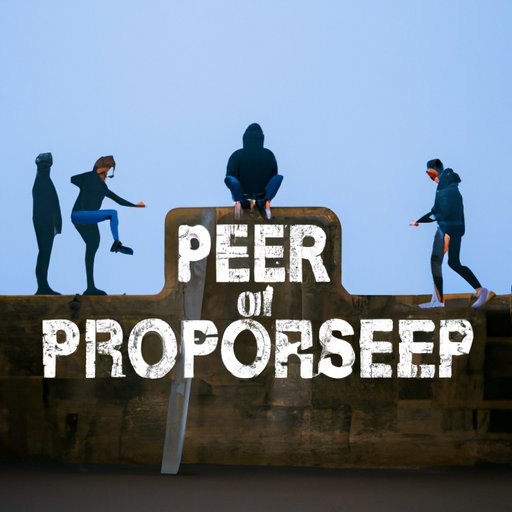Introduction
Peer pressure is defined as the feeling that one must do something because everyone else is doing it. It’s a common form of social influence that we all experience in our lives, especially during adolescence. While peer pressure can have both positive and negative effects, it often has a stronger impact on decision making, particularly in situations where there is a sense of urgency or risk involved. In this article, we’ll explore how peer pressure affects decision making and discuss the implications for individuals and society.

Analyzing the Impact of Peer Pressure on Decision Making
When it comes to decision making, peer pressure can be a powerful influence. It can be used to encourage people to make positive choices, such as studying hard or abstaining from drugs and alcohol. But it can also lead to risky behaviors, such as reckless driving or engaging in dangerous activities. To understand how peer pressure affects decision making, it’s important to look at how social norms, friendships, and group dynamics play a role.
How Social Norms Influence Choices
Social norms are the accepted standards of behavior within a given society or group. They can be enforced through informal means, such as peer pressure, or formal means, such as laws. When it comes to decision making, social norms can have a significant impact. People often look to their peers for cues about what is considered acceptable behavior. If a particular behavior is seen as socially acceptable, it will likely be adopted by others in the group. On the other hand, if a behavior is seen as unacceptable, it may be discouraged or even punished.
Examining Friendships and Group Dynamics
Friendships and group dynamics play an important role in decision making. When we are part of a group, we may feel a sense of belonging and acceptance. This can lead us to conform to the group’s norms, even if those norms go against our own values and beliefs. We may also be more likely to take risks if we believe that our friends will support us or if we think we will gain approval from the group. This can lead to poor decision making, as we may not consider the potential consequences of our actions.
Exploring the Role of Peer Pressure in Risky Behaviors
Peer pressure can also lead to risky behaviors, such as drug and alcohol use, sexual activity, or gambling. These behaviors can be especially risky for adolescents, who may not have the maturity to evaluate the potential consequences of their actions. Research shows that teens who engage in risky behaviors are more likely to have friends who also engage in these behaviors. This suggests that peer pressure plays an important role in the decision to participate in risky activities.
Investigating the Link Between Peer Pressure and Mental Health
The impact of peer pressure on decision making doesn’t end with risky behaviors. It can also have a significant effect on mental health. Studies have found a link between negative peer pressure and depression, anxiety, and low self-esteem. For example, teens who are constantly exposed to negative peer pressure may start to doubt themselves and feel like they are not good enough. This can lead to feelings of worthlessness and helplessness, which can in turn lead to mental health issues.
Understanding How Peer Pressure Impacts Mental Health
It’s important to understand how peer pressure can affect mental health. When someone is exposed to negative peer pressure, they may start to feel like they don’t fit in or that they need to change in order to be accepted. This can lead to feelings of insecurity and self-doubt, which can contribute to mental health issues. Additionally, people may start to engage in risky behaviors in order to gain acceptance, which can further exacerbate mental health issues.
Examining the Connection Between Negative Peer Pressure and Poor Decisions
Negative peer pressure can also lead to poor decision making. Teens may be more likely to engage in risky behaviors or make decisions that are not in their best interest in order to fit in with their peers. They may also be more likely to take risks or make impulsive decisions without considering the potential consequences. This can lead to serious problems, such as substance abuse, criminal activity, or self-harm.
Conclusion
Peer pressure is a powerful influence on decision making. It can lead to both positive and negative outcomes, depending on the situation. Social norms, friendships, and group dynamics all play a role in how peer pressure affects decision making. Additionally, research has shown that negative peer pressure can lead to mental health issues and poor decision making. To overcome the negative effects of peer pressure, it’s important to practice assertiveness and resist the pressure to conform to the group.
(Note: Is this article not meeting your expectations? Do you have knowledge or insights to share? Unlock new opportunities and expand your reach by joining our authors team. Click Registration to join us and share your expertise with our readers.)
